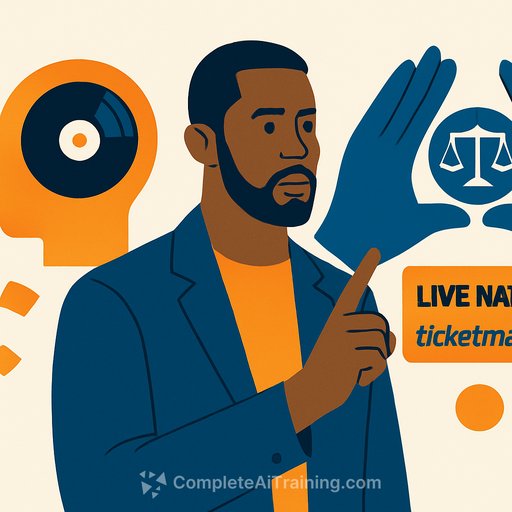Legal Beat: Music & Tech Law Briefing - 9/23/2025
This week clarified a core tension in music law: the market wants AI music at scale; the law still questions who owns it and who pays when it goes wrong. Below are the facts that matter and the risk points counsel should flag now.
The big story: AI record deal tests ownership and liability
Xania Monet - the avatar of Telisha Jones, who writes lyrics and uses Suno to generate the music - reportedly signed a multimillion-dollar record deal. The move drew immediate industry reaction, including pushback from artists like Kehlani ("I don't respect it").
Key issue: what protectable rights exist in AI-generated sound recordings and compositions. Current U.S. guidance limits protection to human-authored elements, with disclosure obligations for AI contributions, which complicates registration, licensing, and enforcement across catalogs and syncs. See the U.S. Copyright Office's AI resource center for the latest guidance here.
- Deal terms to tighten: authorship definitions, deliverables that require human contribution, disclosures to registries, and crediting.
- Risk allocation: broad representations on training data provenance, indemnities for third-party infringement, takedown response SLAs, and platform policy compliance.
- Monetization reality check: PRO registration hurdles and potential distribution friction if outputs trigger content ID or model-training disputes.
Other key developments
Blige case tossed. A federal judge dismissed claims that Mary J. Blige's "Real Love" infringed the oft-sampled 1973 track "Impeach the President." The court found the works "do not sound the same," reinforcing that high-level stylistic overlap and common drum patterns alone rarely clear the substantial-similarity bar.
Diddy sentencing bid + support letters. Sean "Diddy" Combs asked a federal judge for a 14-month sentence on his prostitution convictions; with 13 months already served, that would mean near-immediate release. Defense filed dozens of letters from family and industry supporters urging leniency.
Suno suit 2.0. Major labels amended their lawsuit to allege Suno "stream-ripped" YouTube audio to train its models. Even as some courts suggest training may qualify as fair use, claims tied to acquiring works through unauthorized means can amplify exposure, including DMCA anti-circumvention and state-law theories; see 17 U.S.C. § 1201 text.
FTC vs. Live Nation/Ticketmaster. The FTC sued over allegedly misleading ticket prices and enabling scalpers to buy and resell at markups. Expect heightened scrutiny of fee disclosures, queue/bot controls, and reseller integrations; compliance teams should reassess UDAP risk, ticketing TOS enforcement, and monitoring/ban systems.
Mike Tyson hype video settlement. Tyson settled a suit alleging he used the 1998 track "Murdergram" in an Instagram training clip promoting his Jake Paul fight. Takeaway: social promo still requires sync and master rights; "short clip on social" is not a safe harbor.
Meta targets Eight Mile Style complaint. Meta moved to dismiss claims that "Lose Yourself" and other works were made available to billions of users, arguing the pleading lacks specifics. For plaintiffs, courts continue to expect concrete URLs, dates, files, and copying pathways - not generalized scale assertions.
Prince estate vs. Apollonia. The estate asked to dismiss Apollonia's claim that it seeks to "steal" her name, stating it does not intend to force a name change and noting her post-2016 trademark filings. Watch for how coexistence, consent history, and posthumous brand control are weighed against long-standing stage-name use.
Beéle sex tape leak suit. Ex-girlfriend Isabella Ladera sued for invasion of privacy and sexual cyberharassment, asserting he is responsible for the leak; his camp denies. Discovery will center on device access, cloud logs, deletion timelines, and third-party platform data preservation.
Megan Thee Stallion discovery fight. Her counsel seeks to compel DJ Akademiks to disclose whether Tory Lanez sent him a confidential DNA report during the criminal case, tied to a defamation action against Milagro Gramz. Expect motion practice on source identity, privilege claims, and the scope of protective orders.
Practical actions for counsel
- AI deals: mandate human authorship thresholds, training data provenance warranties, and indemnities that survive takedowns and policy shifts.
- Ticketing clients: tighten fee disclosures, bot mitigation, reseller policies, and audit logs; align marketing with advertised all-in pricing.
- Social content: clear sync/master rights even for short promotional clips; update creator playbooks and pre-post clearance checks.
- Litigation posture: for platform cases, demand specificity; for plaintiffs, build records with links, dates, and identifiable copies.
What to watch next
- Whether labels' "stream-ripping" allegations against AI music firms survive early motions and expand damages theories.
- Any court guidance that further clarifies protectable human contribution in AI-assisted music and the registrability of such works.
- Regulatory momentum on ticketing fees and bot controls, and its impact on marketplace and promoter contracts.
Your membership also unlocks:






